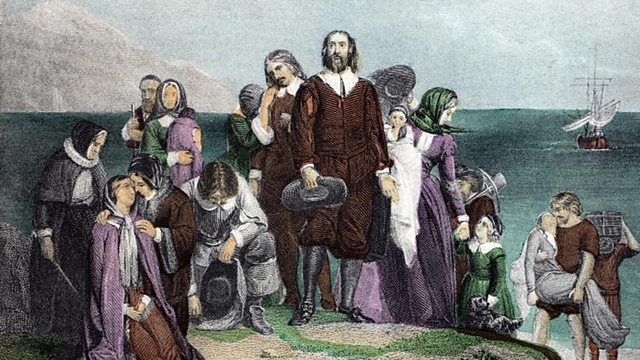Squanto
Margaret Verble, Pulitzer-nominated novelist, considers the role of Native Americans in the Mayflower myth.
Five essays reflect on the impact of the Puritan Pilgrims setting sail on the ship the Mayflower 400 years ago, from Plymouth in England heading west to βthe New Worldβ. Writers look at what the anniversary means to Americans in 2020, and create portraits of some of the key players: two of the passengers, and two of the Native Americans who met them.
The tale of the 'Pilgrim Fathers' became part of the foundation myth of the United States. On the 400th anniversary of their setting sail, Nick Bryant (ΒιΆΉΤΌΕΔ New York correspondent) gives an overview of what the anniversary means in America this year, at a time when that myth is under scrutiny more than ever, and Margaret Verble (Cherokee writer, her book βMaudβs Lineβ a finalist for the 2016 Pulitzer) explores the motivations of Tisquantum, Native American ally and translator to the Pilgrims. Michael Goldfarb (American author, journalist and broadcaster) writes a portrait of John Alden, the crew member turned colonist, Rebecca Fraser (Historian and author of βThe Mayflower: the Families, the Voyage, and the Founding of Americaβ) uncovers the story of Susanna White-Winslow, Mayflower passenger, and David Silverman (American historian and author) looks at the decisions facing Metacom: a child when the Mayflower landed, he would become a resistance leader.
Margaret Verble, author of the Pulitzer finalist novel βMaudβs Lineβ and βCherokee Americaβ, considers the life and legacy of Squanto, a Native American man who acted as an interpreter and guide to the Pilgrim settlers, whose motives have been blurred by history.
Last on
More episodes
Broadcast
- Tue 15 Sep 2020 22:45ΒιΆΉΤΌΕΔ Radio 3
Death in Trieste
Watch: My Deaf World
The Book that Changed Me
Five figures from the arts and science introduce books that changed their lives and work.
Podcast
-
![]()
The Essay
Essays from leading writers on arts, history, philosophy, science, religion and beyond.





